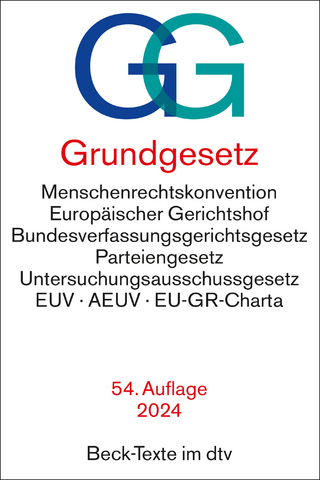
Human Rights in the Council of Europe and the European Union
Achievements, Trends and Challenges
Seiten
2019
Cambridge University Press (Verlag)
978-1-107-66357-2 (ISBN)
Cambridge University Press (Verlag)
978-1-107-66357-2 (ISBN)
The first book-length study of human rights in the Council of Europe and the European Union, this volume makes a vital contribution to the post-Brexit debate in the UK by providing concise, authoritative summaries of the case law of the European Court of Human Rights (ECHR) and the fundamental rights case law of the European Court of Justice.
Confusion about the differences between the Council of Europe (the parent body of the European Court of Human Rights) and the European Union is commonplace amongst the general public. It even affects some lawyers, jurists, social scientists and students. This book will enable the reader to distinguish clearly between those human rights norms which originate in the Council of Europe and those which derive from the EU, vital for anyone interested in human rights in Europe and in the UK as it prepares to leave the EU. The main achievements of relevant institutions include securing minimum standards across the continent as they deal with increasing expansion, complexity, multidimensionality, and interpenetration of their human rights activities. The authors also identify the central challenges, particularly for the UK in the post-Brexit era, where the components of each system need to be carefully distinguished and disentangled.
Confusion about the differences between the Council of Europe (the parent body of the European Court of Human Rights) and the European Union is commonplace amongst the general public. It even affects some lawyers, jurists, social scientists and students. This book will enable the reader to distinguish clearly between those human rights norms which originate in the Council of Europe and those which derive from the EU, vital for anyone interested in human rights in Europe and in the UK as it prepares to leave the EU. The main achievements of relevant institutions include securing minimum standards across the continent as they deal with increasing expansion, complexity, multidimensionality, and interpenetration of their human rights activities. The authors also identify the central challenges, particularly for the UK in the post-Brexit era, where the components of each system need to be carefully distinguished and disentangled.
Steven Greer is Professor of Human Rights at the University of Bristol Law School. Janneke Gerards is Professor of Fundamental Rights Law at Universiteit Utrecht, The Netherlands. Rose Slowe is Honorary Research Fellow at the University of Bristol Law School and a barrister.
Preface; 1. Historical and conceptual background; 2. The Council of Europe; 3. The case law of the European Court of Human Rights; 4. The European Union; 5. The fundamental rights jurisprudence of the European Court of Justice; 6. Summary and conclusion.
| Erscheinungsdatum | 10.09.2019 |
|---|---|
| Reihe/Serie | Cambridge Studies in European Law and Policy |
| Verlagsort | Cambridge |
| Sprache | englisch |
| Maße | 225 x 150 mm |
| Gewicht | 810 g |
| Themenwelt | Recht / Steuern ► EU / Internationales Recht |
| Recht / Steuern ► Öffentliches Recht ► Verfassungsrecht | |
| Sozialwissenschaften ► Politik / Verwaltung ► Europäische / Internationale Politik | |
| Sozialwissenschaften ► Politik / Verwaltung ► Politische Systeme | |
| ISBN-10 | 1-107-66357-1 / 1107663571 |
| ISBN-13 | 978-1-107-66357-2 / 9781107663572 |
| Zustand | Neuware |
| Haben Sie eine Frage zum Produkt? |
Mehr entdecken
aus dem Bereich
aus dem Bereich
mit Menschenrechtskonvention, Verfahrensordnung des Europäischen …
Buch | Softcover (2024)
dtv Verlagsgesellschaft
9,90 €


